Organizing, according to wikitionary.org has two definitions that are our concern: it is the act of “arranging in working order” and a way “to constitute in parts, each having a special function, act, office, or relation; to systematize”.
During my bachelor years, my work and life was all over the place and the future was a great source of anxiety. Someday I would feel motivated by a task, and other days completely crushed by the weight of what I would have to do in the short and long run. More recently, I had the chance of having a lot of free time during my study abroad. At first, it seemed great to stay home and watch all those movies on my list, however, if you are anything like me you will inevitably end up on scrolling on social media until eventually you start wondering: why am I wasting so much time ?
I am probably not the only one with those kind of thoughts:
“I am not doing what I should be doing right now”
“If only I would really work for once”
“So much stuff is happening I would rather just do nothing and let time pass”
I always had this thing tickling in my head saying there must be some better way. There had to be a way to organize all of those tasks.
One day while lying on the sofa I came across a random recommended YouTube video from a university student. If I remember correctly the guy was talking about his methods and organization to study and to achieve good grades. He said something that was true for all mental tasks and that stayed in my mind since: “work is the product of focus and time”. We cannot achieve much with great focus in only a few minutes. Likewise, putting in hours and hours on end while being distracted does not achieve much either.
The only solution to achieve better results is to put more of both.
I hear you say:
“But my days are not infinite I cannot just put more hours”
Or
“I tend to loose my focus at some point anyway”.
We are all humans, I cannot keep my focus indefinitely and my time is limited too. However, I have come to the realization that I can optimize this.
Systematizing
That’s where the “systematize” part comes in. I use a quite well known technique called “pomodoro”. If you have never heard of it I suggest that you look into it. A lot of people have already described it better than ever I will.
A simple cycle looks something like this:
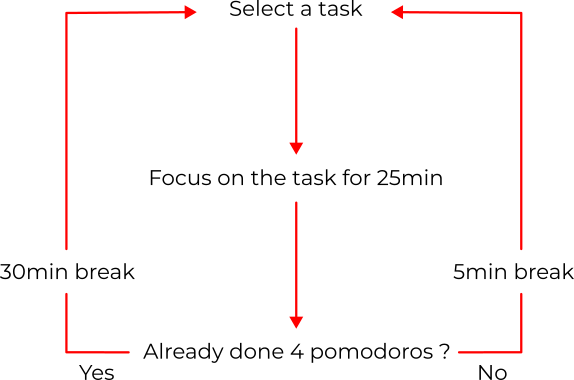

There are multiple advantages to this method:
- I am forced to use a divide and conquer strategy by cutting big tasks into smaller tasks
- I am forced into arranging my days in 2h groupings consisting of 4 30 minutes-long blocks each (25min + 5min break)
- I am forced to take breaks
- I can ignore people with this as an excuse
The last one might seem weird or mean but I actually experienced it first hand. I had a colleague doing that back when I was working for a french startup during an internship. When he was working he would just completely ignore me (or basically anyone) until he was done with his task. No answers, nothing. This created weird situations where I would ask him something only to be answered 10 minutes later ! Nevertheless, this allowed him to take the so many little things that happens in a company (like an intern asking obvious questions - sorry !) and put them on a backlog for later, thus preserving his focus.
Also, I use an improvement to this technique that I read about on some website (but cannot find a link to). Instead of keeping a to-do list next to me, I keep an “unplanned stuff” list. It helps with a problem I face regularly when focused on some task : sometimes, I get distracted by things like “Oh I forgot to do laundry”, “I want to watch this movie”, … Those thoughts might be useful or not but they are distracting nevertheless. The best thing to do is to write them down and sort them out during the next break. The list is temporary. It should not last for more than a day as to prevent misinterpreting the notes later.
Removing to-do lists
While looking into pomodoro technique, you might have seen people talk about having a to-do list and picking tasks from this list.
Now, let it be clear that I hate to-do lists except for groceries. The reason for that is that to-do lists do not encourage me to be as SMART as I can be. If you have done any management course, you should recognize this principle that describes the properties of any good objective. Any objective should be Specific Mesurable Attainable Time constrained and Relevant.
Imagine a simple task:
Paint the wall
Is it specific ? Hell no! Which wall am I supposed to paint ? What color ? Should I do multiple layers ? Do I need to buy a paint bucket ? And the tools ?
Is it measurable ? For sure we could measure what percentage of the wall we painted or what how many coat of paint we applied. Still, this was not clearly mentioned in the task - and should be.
Is it attainable ? Well, there is two famous words for this: it depends. Am I an professional painter or a DIY guy ? Maybe even a total noobie ? Here the task lacks context.
Is it relevant ? Is it my job ? Or just a side project of mine ? Maybe the wall was painted last week already ? Here too, the task lacks context.
Is it time constrained ? Nope, no one told us when the wall is supposed to be painted. Might as well start tomorrow or the day after !
So a better task would be:
To: painting company employee. From: Boss. Paint the northern wall of kitchen at 123 avenue 12345 CITY with two coats of white. Supply is already on site. To be done by 11 November 2023 at 1pm.
While I cannot just yet make a computer check if my tasks are specific, attainable, measurable or relevant, I can force them to be time constrained. So I replaced my to-do lists by another tool everyone has on their computer or phone: a calendar.
So, to recap, I use the pomodoro on the micro scale to keep focus up for as long as possible and I make my tasks SMART to be sure this focus time is well spent. Of course the above description to paint the wall is verbose and In the real world I would write something smaller. What matters is to think about how to make the task SMART before doing it.
Macro scale
Using a calendar over a to-do list introduced me to a macro organization scale. Instead of just planning a few 30min blocks, now I can plan a entire week.
During my first semester as a foreign exchange student at SIIT, Thammasat University, I took the “Computer Architecture” course. Now, the concept of lectures is probably the dumbest thing invented by man in my opinion, but I used this boredom to my advantage. You see, computers at the lowest level try has hard as possible to use their cycles (their time) as efficiently as possible. Every trick possible was used to make sure that every part of the CPU pipeline is used at any given time! Thus, while drawing some diagram of the CPU pipeline, I was inspired to take those principles and apply them to my own tasks.
Notice that since the beginning of this article, I have never talked of professional work but only of tasks. That is because I do not make a difference between “programming for work” and “doing laundry” or even “watching a movie”. Those are fundamentally just investing some time with a different return. So, in my calendar, I like to only group tasks by who is their recipient: “for university”, “for me”, “for company”, etc …
Since then, every Sunday, I set aside an hour to plan for the tasks to be completed the next week. This is a process very similar to time boxing. During this hour, for every tasks that come to mind, I try to answer several questions:
- Can I break it down into subtasks ?
- Is it a SMART objective ?
- How long will it take me ?
- When should I do it ?
Those questions are subjective but I will try to describe the process I usually follow:
First step is to break down my task into as many subtasks as possible. The more, the better.
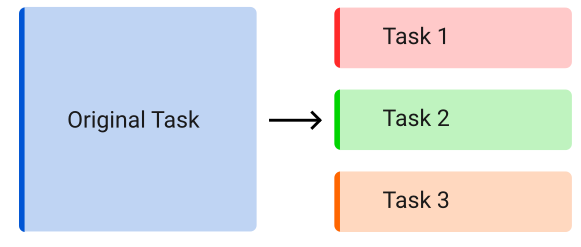

Then I make sure the tasks are SMAR (without the T, that’s the next step). See Removing to-do lists for details.
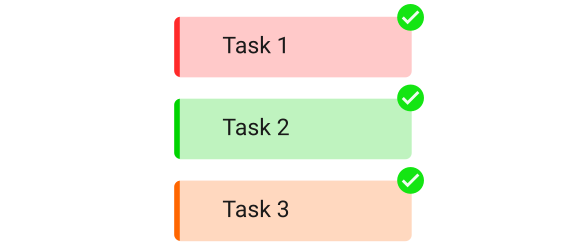

In the third step I try to intuitively decide how long it’s going to take me to complete the tasks. This can be hit or miss, so I come with a time frame and take the upper bound. In the best case scenario, the task length will be shorter than I thought and I will be able to switch to another task earlier than expected.
Example: I think Task 2 could take me as little as 30min and as long as 1h30 to finish, so I create a 1h30 long event in the calendar.
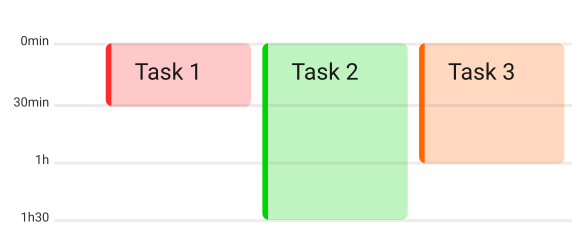

Finally, I can usually decide simply when to do the task, but, if time is at a premium, I use the Eisenhower matrix to divide what’s urgent or not and what’s important or not. In this case, I would start with the most urgent and important tasks.
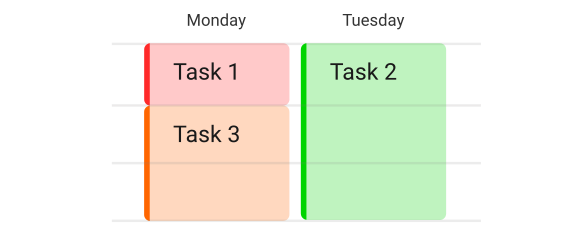

With that covered, I want to insist that this calendar setup at the beginning of the week is not set in stone. Through the week I move tasks around, I add some new ones, I resize them because they took me more or less time than expected, etc … The calendar should be seen as a model of how the time was spent and should aim at being more and more representative of the reality of events as time passes. It should not be a constraint.
Finally, I would like to emphasize that, unfortunately, we are all humans and need some time for ourselves. Keeping a few hours a day empty means I can be flexible by moving tasks around when I don’t feel motivated.
End word
This entire protocol was really made by me, for me. A lot of elements are subjective. Maybe in the future my ideas will change or I will need something less strict. So far it has been an improvement for me over not having any protocol at all. I hope you could find some inspirations while reading this to improve on your own organization.